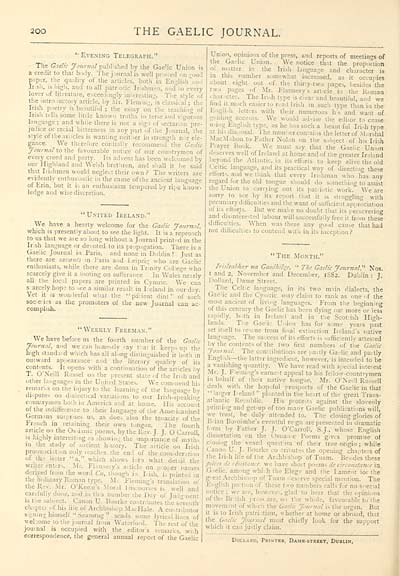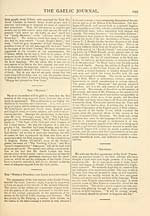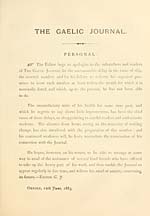Blair Collection > Gaelic journal > Volume 1, number 1
(212)
Download files
Complete book:
Individual page:
Thumbnail gallery: Grid view | List view

THE GAELIC JOURNAL.
'•Evening Telegraph."
The Gaelic J««vm/ published by the Gaelic Union is
a credit to that body, 1 lie j.mrna! is well prin:ed nn -ood
paper, the quality of the arti-!- l-.'i: v. '-'" -'^ 'i" mi
Ir.sh, is higli, and toall ji.i'i >■ ,.,-,.
lover of literature, exceeiim of
the introiuctoivartirle, l.y ,v .
I'-i^'i r-'^--'' •■;:-':i:' ■:-
Union, opinions of the press, and reports of meetings of
the Gaelic Union. We
of m.itter in the Irish
in this number s .m_wliat
about eight . . : '
P^S
otice that the propoiiion
angnage and character is
increased, as it occupies
'■- :-!■■. • : M.c , le.ides the
^ ! ■ ivoniaii
ly.e ,
\\a
gancc. we iiurriurc coi\iiallv recomnieii
7i>;»«<r/tothe favourable notice of our cou
every creed and party. Its .advent has been w-
our Highland and \Vel,,h brethren, and si. all
that I, id, men would neglect their own ? The v
evidently enthusiastic in the cause oftlieancien
of Erin, but it i, an enthusiasm tenijjcred bv i
ledge and wise discretion.
" United Ireland."
We h.ave a hearty welcome for the Gaelic Journal,
which is presently about to see the light. It is a reproach
to us that we are so long without a Journal printed in the
Irish language or deioted to its propagation. There is a
Gaelic Journal in Paris, and none in Dublin ! Just as
there are saranH in I'aris and I eipzig who are G.aelic
enthusiasts, while there are do.i, in Tr u tv Col e^e who
scarcely give it a looting on " \'.'ales°nearly
all the local papers are |. , We can
s arcely hope to see a simil,,; , , ,„ our day.
Yet It IS wonlei-ful what V ,,,;- of such
soceiics as tlie promutei-s of the new Jujrual can ac-
complish.
"Weekly Freeman."
We have before us the fourth number of the Gaelic
Jonrnnl, and wecanhoneMly .ay t: a: it keep, up the
high standa.d which has all al u,,' di eiiuui.hcd it both in
outward appearance ai.d th ■ oi i ,, o:,,,|i,y of its
contents. It opens with a c..;,' en - i li ,. articles l>v
T O'Neill Rus,el on the pr. ni -Lc ■, f tlie' Iridr and
other langu.ages in the United Staler. We commend hi,
on the injury to the learning of the language by
on dialectical variations to our Irish-.speaking
len b ) h in Ameiicaand at home. His account
.' '-' ÌICU language of the Ameiicanised
u , .1, ,ioes also the tenacity of the
1 'I la' 11- own tongue. The fourth
remark:
di.pute
roll.
Hml
■.,',. ■ '• - - !;:- :ii.niuthe
■ .- wiiii tl.u- numerous hs and want of
i. We would .advise the editor to ce.ase
! type, as he has such a lieaut ful Iri-,h type
il. Ihe num.crconiains the letter of Marshal
• ■ '' " ' ' I'-li' I- Nolo, -.;i t:,r s,i,|ect of his Irish
' ■■■'- ^■" !•■ ■' ■ ■■ : V r. • i:ic Gaelic Union
: ■'■■ ■' ■■■■ '' ■■' I' '■■■'■ ■ 1 a ■ ::. ' ^ : ae greater Ireland
;:-);:■' yl"' --;' 'i:'.;a ,;-,.(,,,,., ,_, ^eep aUvetheold
I e.iic language and its pr.actical way of directing these
ellorts, and we thnik that every Irishman who has any
regard for the old tongue should do something to assist
the Union in canving oi,t its pat.iotic work. We are
sorry to see bv n- i ■.,,ii ihut it is struggling with
pecimiarydilhLi ■ ml of sufficient appreciation
of Its efior.ts. 1: ,i ,, a „ „,_, duubt that its persevering
and disinterested ,aOuui uiil successfully free it from these
difficulties. When was there any good cause that had
not difficulties to contend with in its inception?
"The Month."
Ga 7 I^e, " The Gaelic Journal." Nos.
December, 1S82. Dublin : J.
T' , in its two main dialects, the
Gai 1 I I 1 I 1 IK may claim to rank as one of the
most anc 1 nt of Iniig languages. From the beginning
of this centuiy the Gaelic has been dying (nit more or less
lapidly, bith in Ireland and in the Scotdsh High-
lands Ti e Gaelic Union has foi some years past
set Itself to le-cue from final extinction Ireland's native
language. The success of its efioits k sufiicientb' attested
by the contents of the two first numbers of the Gaelic
Jo nnal The (.oniiibution, aie paitly Gaelic and partly
English— the latter ingredient, however, is intended to be
a vanishing quantity. We have read with special interest
Ml. J. F eming's eaine-t appeal to his fellow-countrymen
in behalf of 'h- 1 m'n- t 1 "up Mr. O'Neill Russell
deals with the 1 t 1 , ,, of the Gaelic in that
"laiger Iielaii I 1,. rt of the great Trans-
atlantic Rpi 1' 1 1 I I u .ag.rinst the slovenly
Pnn 1 " - 1 ' I , , 111 iin Uaehc publications will,
«em ' 1 nded to. The closing glories of
Binij [ lul re gn aie presented ill dramatic
'/rm ' i ill O'Canoll, S J., whose English
' ' 1 i r itms gives promise of
1 I their true origin ; while
ihe opening chapters of
I of Tuam. Besides these
n i, slioit poems de circoiistance in
I Elegv and the Lament for the
' tin ilestrve special mention. The
tvonuiib 1, call, for no special
:- " aiibci the Day of Ju.ig nent
' I airke contributes the seventh
' i"P-MaeHale. A contributor
^ - - ",-, ' sends some lyrical lines of
wel.omc lo tiie journal from Waterfoid. The rest of the
jouinal IS occupied with the editor's remarks, with
correspondence, the general annual report of the Gaelic
ofth
.■e.al, tha
the supjior
DoLLARD, Printer, Dame-street, Dublin,
'•Evening Telegraph."
The Gaelic J««vm/ published by the Gaelic Union is
a credit to that body, 1 lie j.mrna! is well prin:ed nn -ood
paper, the quality of the arti-!- l-.'i: v. '-'" -'^ 'i" mi
Ir.sh, is higli, and toall ji.i'i >■ ,.,-,.
lover of literature, exceeiim of
the introiuctoivartirle, l.y ,v .
I'-i^'i r-'^--'' •■;:-':i:' ■:-
Union, opinions of the press, and reports of meetings of
the Gaelic Union. We
of m.itter in the Irish
in this number s .m_wliat
about eight . . : '
P^S
otice that the propoiiion
angnage and character is
increased, as it occupies
'■- :-!■■. • : M.c , le.ides the
^ ! ■ ivoniaii
ly.e ,
\\a
gancc. we iiurriurc coi\iiallv recomnieii
7i>;»«<r/tothe favourable notice of our cou
every creed and party. Its .advent has been w-
our Highland and \Vel,,h brethren, and si. all
that I, id, men would neglect their own ? The v
evidently enthusiastic in the cause oftlieancien
of Erin, but it i, an enthusiasm tenijjcred bv i
ledge and wise discretion.
" United Ireland."
We h.ave a hearty welcome for the Gaelic Journal,
which is presently about to see the light. It is a reproach
to us that we are so long without a Journal printed in the
Irish language or deioted to its propagation. There is a
Gaelic Journal in Paris, and none in Dublin ! Just as
there are saranH in I'aris and I eipzig who are G.aelic
enthusiasts, while there are do.i, in Tr u tv Col e^e who
scarcely give it a looting on " \'.'ales°nearly
all the local papers are |. , We can
s arcely hope to see a simil,,; , , ,„ our day.
Yet It IS wonlei-ful what V ,,,;- of such
soceiics as tlie promutei-s of the new Jujrual can ac-
complish.
"Weekly Freeman."
We have before us the fourth number of the Gaelic
Jonrnnl, and wecanhoneMly .ay t: a: it keep, up the
high standa.d which has all al u,,' di eiiuui.hcd it both in
outward appearance ai.d th ■ oi i ,, o:,,,|i,y of its
contents. It opens with a c..;,' en - i li ,. articles l>v
T O'Neill Rus,el on the pr. ni -Lc ■, f tlie' Iridr and
other langu.ages in the United Staler. We commend hi,
on the injury to the learning of the language by
on dialectical variations to our Irish-.speaking
len b ) h in Ameiicaand at home. His account
.' '-' ÌICU language of the Ameiicanised
u , .1, ,ioes also the tenacity of the
1 'I la' 11- own tongue. The fourth
remark:
di.pute
roll.
Hml
■.,',. ■ '• - - !;:- :ii.niuthe
■ .- wiiii tl.u- numerous hs and want of
i. We would .advise the editor to ce.ase
! type, as he has such a lieaut ful Iri-,h type
il. Ihe num.crconiains the letter of Marshal
• ■ '' " ' ' I'-li' I- Nolo, -.;i t:,r s,i,|ect of his Irish
' ■■■'- ^■" !•■ ■' ■ ■■ : V r. • i:ic Gaelic Union
: ■'■■ ■' ■■■■ '' ■■' I' '■■■'■ ■ 1 a ■ ::. ' ^ : ae greater Ireland
;:-);:■' yl"' --;' 'i:'.;a ,;-,.(,,,,., ,_, ^eep aUvetheold
I e.iic language and its pr.actical way of directing these
ellorts, and we thnik that every Irishman who has any
regard for the old tongue should do something to assist
the Union in canving oi,t its pat.iotic work. We are
sorry to see bv n- i ■.,,ii ihut it is struggling with
pecimiarydilhLi ■ ml of sufficient appreciation
of Its efior.ts. 1: ,i ,, a „ „,_, duubt that its persevering
and disinterested ,aOuui uiil successfully free it from these
difficulties. When was there any good cause that had
not difficulties to contend with in its inception?
"The Month."
Ga 7 I^e, " The Gaelic Journal." Nos.
December, 1S82. Dublin : J.
T' , in its two main dialects, the
Gai 1 I I 1 I 1 IK may claim to rank as one of the
most anc 1 nt of Iniig languages. From the beginning
of this centuiy the Gaelic has been dying (nit more or less
lapidly, bith in Ireland and in the Scotdsh High-
lands Ti e Gaelic Union has foi some years past
set Itself to le-cue from final extinction Ireland's native
language. The success of its efioits k sufiicientb' attested
by the contents of the two first numbers of the Gaelic
Jo nnal The (.oniiibution, aie paitly Gaelic and partly
English— the latter ingredient, however, is intended to be
a vanishing quantity. We have read with special interest
Ml. J. F eming's eaine-t appeal to his fellow-countrymen
in behalf of 'h- 1 m'n- t 1 "up Mr. O'Neill Russell
deals with the 1 t 1 , ,, of the Gaelic in that
"laiger Iielaii I 1,. rt of the great Trans-
atlantic Rpi 1' 1 1 I I u .ag.rinst the slovenly
Pnn 1 " - 1 ' I , , 111 iin Uaehc publications will,
«em ' 1 nded to. The closing glories of
Binij [ lul re gn aie presented ill dramatic
'/rm ' i ill O'Canoll, S J., whose English
' ' 1 i r itms gives promise of
1 I their true origin ; while
ihe opening chapters of
I of Tuam. Besides these
n i, slioit poems de circoiistance in
I Elegv and the Lament for the
' tin ilestrve special mention. The
tvonuiib 1, call, for no special
:- " aiibci the Day of Ju.ig nent
' I airke contributes the seventh
' i"P-MaeHale. A contributor
^ - - ",-, ' sends some lyrical lines of
wel.omc lo tiie journal from Waterfoid. The rest of the
jouinal IS occupied with the editor's remarks, with
correspondence, the general annual report of the Gaelic
ofth
.■e.al, tha
the supjior
DoLLARD, Printer, Dame-street, Dublin,
Set display mode to: Large image | Transcription
Images and transcriptions on this page, including medium image downloads, may be used under the Creative Commons Attribution 4.0 International Licence unless otherwise stated. ![]()
| Early Gaelic Book Collections > Blair Collection > Gaelic journal > Volume 1, number 1 > (212) |
|---|
| Permanent URL | https://digital.nls.uk/79315460 |
|---|
| Description | No. 1, Vol. I. November, 1882. |
|---|---|
| Shelfmark | Blair.214 |
| Additional NLS resources: | |
| Attribution and copyright: |
|
| Description | A selection of books from a collection of more than 500 titles, mostly on religious and literary topics. Also includes some material dealing with other Celtic languages and societies. Collection created towards the end of the 19th century by Lady Evelyn Stewart Murray. |
|---|
| Description | Selected items from five 'Special and Named Printed Collections'. Includes books in Gaelic and other Celtic languages, works about the Gaels, their languages, literature, culture and history. |
|---|

